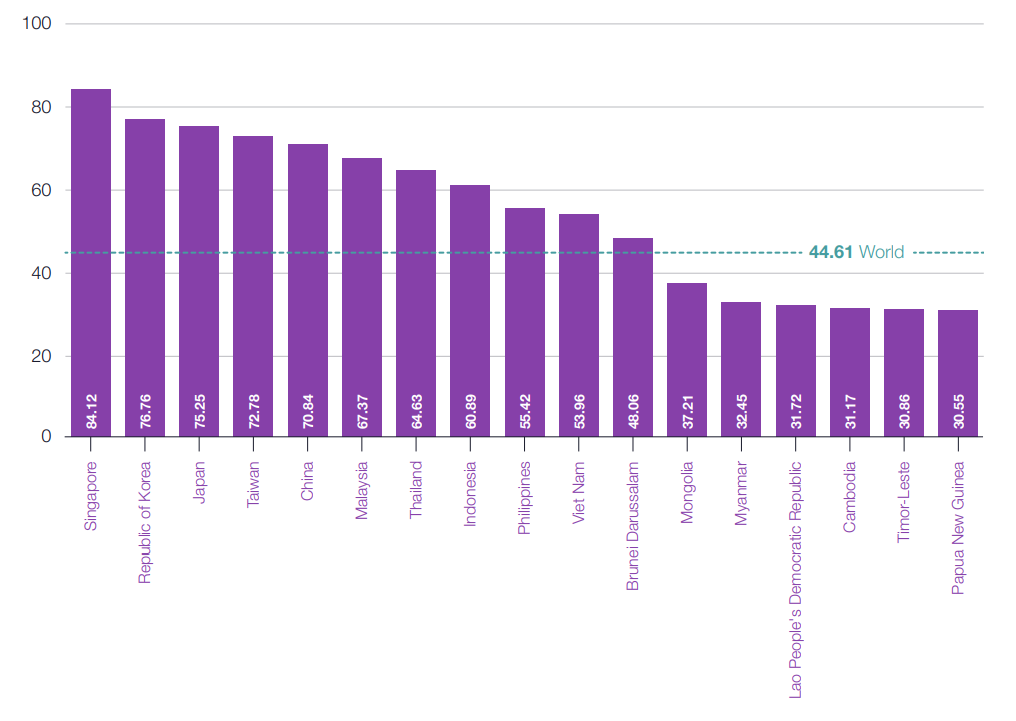ASEAN's Artificial Intelligence Challenge Takes Shape Amid Southeast Asia's Evolving Digital Landscape
A scan of Southeast Asia's AI future(s) amid a dynamic, multistakeholder global conversation.
ASEAN’s Artificial Intelligence Challenge Takes Shape Amid Southeast Asia’s Evolving Digital Landscape
As ASEAN looks to shape the development of regional guidelines around artificial intelligence (AI) in the coming months, it will do so in a context of multifaceted global challenges and a contested regional landscape. Few regions offer the weight and promise of ASEAN’s digital economy, and some countries are already leading or influencing the broader international conversation. At the same time, apart from intensifying U.S.-China competition and a still nascent global standards development picture, there are massive disparities across Southeast Asian states on the state of AI readiness, and there are anxieties around areas like governance, awareness and skilling that could impact countries across realms — from their economic outlooks down to their entire social compacts.
WonkCount: 1,858 words (~9 minutes).
What Is Going On
ASEAN is expected to further develop the grouping’s approach to AI in the coming months. The ASEAN Digital Ministers’ Meeting in February publicly noted the development of a guide on AI governance and ethics this year, in addition to other guidelines and reports already discussed within the grouping1.
This evolving approach comes as individual Southeast Asian states continue to evolve their own AI approaches. In just the first half of 2023 alone, we have seen AI in focus alongside other domestic, regional and global developments — including Singapore’s first joint AI lab of its kind with a foreign nation; Vietnam’s approach to social media companies on content moderation; and Indonesia’s approach to potential disinformation threats with its coming 2024 elections (see table below)2.
How We Got Here
AI’s evolution in Southeast Asia is part of of a broader story of digital development. As noted before in these pages, like 5G, AI tends to be tied to adjustments by Southeast Asian states’ to the so-called Fourth Industrial Revolution (Industry 4.0 or 4IR) powered by cyberphysical systems, following previous revolutions enabled by steam, electricity and preliminary automation and machinery respectively3. These adjustments often reflect the diversity of regional states themselves. To take just one example, a recent assessment of government AI readiness by Oxford Insights demonstrated the wide range of capabilities across the region, from Singapore on the one hand at well above the world average, and, on the other hand, four countries — Cambodia, Laos, Myanmar and Timor-Leste — well below that average (see image below). Despite these differences, ASEAN has also gradually been formulating approaches at the regional level, be it the ASEAN Digital Masterplan 2025 or studies on aspects of AI more specifically4.
Government AI Readiness Ratings in ASEAN
Beyond the lens of economic opportunity, challenges such as intensified U.S.-China competition and governance gaps have further spotlighted AI in Southeast Asia in recent years. Chinese tech companies have been pursuing AI-related collaborations with regional governments, and some manifestations of that — from the role of Chinese firms in 5G networks (see our take on that here) to the spread of AI surveillance technologies — have raised concerns from other actors including the United States given Beijing’s wider ambitions and existing rights issues in some individual Southeast Asian states5. More broadly, the relatively nascent state of AI governance, awareness and skilling in Southeast Asia has raised anxieties about the extent to which this can complicate realities across a range of other areas including ethics, bias, disinformation, employment and intellectual property standards.
Why This Matters Today
While actual AI development in Southeast Asia still lags the headlines surrounding it, countries are beginning to build out their AI strategies as ASEAN’s regional approach also takes shape. Most Southeast Asian countries are still in the early stage of AI adoption, with differing political and economic systems, diverse approaches to calibrating foreign policy alignments, a wide spectrum of cyber infrastructures, varying governance standards and relatively limited albeit rising investment compared to more established markets such as the United States, China or Europe. Yet countries have rolled out national approaches in recent years, and there are examples of piloting and prioritization among some governments and companies in sectors as diverse as health, education, food security, smart city development and bureaucratic management (see a select list of recent AI approaches in major ASEAN markets below).
Southeast Asia is among the regions being watched within the broader global AI conversation. While much of the headlines have been focused on more robust frameworks that are further along, such as discussions on Europe’s AI Act, as with the General Data Protection Regulation (GDPR) in the data space, there will also be a focus on the extent to which this might affect ongoing regional contexts such as Southeast Asia. At the same time, the region is not without its own agency and impact in this space. Beyond ASEAN-wide efforts, Singapore has already been a leader in the AI governance space, with the country launching the world's first-ever AI governance testing framework and toolkit last year called “AI Verify,” while major markets such as Indonesia (the fourth-largest country in the world) and Vietnam (one of the region’s fastest growing economies last year), will also be closely monitored by not just other governments, but also companies with stakes in the digital space in these emerging markets and already facing challenges such as in cross-border data flows.







